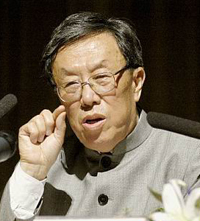Cultural development must address spiritual needs
- By Wang Meng
 0 Comment(s)
0 Comment(s) Print
Print E-mail China.org.cn, April 18, 2012
E-mail China.org.cn, April 18, 2012
|
 |
|
Wang Meng is a renowned writer and former minister of culture.[File photo] |
The purpose of cultural undertakings in China is to meet people's spiritual needs. And it's been widely accepted that advanced culture orients the development of society.
People's spiritual needs can be analyzed as four levels, from basic needs to higher spiritual and cultural needs, including cultural creativity and continuity.
The need for general cultural consumption is the basic level. Traveling, watching a live performance or fashion show, drinking in a bar or tea house, or seeing art exhibitions can fulfill these needs. If these needs are met, people can learn something about culture and perhaps develop a deeper curiosity for art, music, and other cultural aspects. If not, people can become shallow and callous.
Some worry that something called counterculture may emerge into the mainstream as a kind of culture in disguise. Pop culture trends also come and go, blossoming one moment and wilting the next, leaving nothing valuable left behind.
The development of culture to fulfill the need of achieving a more civilized society is the second level. Basic or general cultural consumption can hardly satisfy the need of educated people, who long to become more civilized. Pursuing knowledge and professional expertise, as well as in etiquette and social civility and learning the constitution, laws and regulations, are indispensable to develop a society of advanced citizenry.
The third level of cultural development concerns cultural creativity. Educated people with consciousness and ambition are driven to create, discover, contribute and reform rather than being satisfied in benefiting from existing cultural achievements of society. These people embody the nation's spirit of cultural progress.
At the fourth level is the pursuit of wisdom and truth. People at this level have a strong drive to develop people's welfare and enrich both national and international cultural wealth. Lao Zi and Confucius from the East, Karl Marx, Isaac Newton and Albert Einstein from the West were all highly creative cultural giants.
Different cultural products meet people's different spiritual and cultural needs. However, some cultural achievements, including China's four classic novels (Journey to the West, The Romance of the Three Kingdoms; The Dream of the Red Mansion; Outlaws of the Marshes) can be enjoyed by different people with different spiritual needs.
In our national cultural undertakings, quality of cultural products should be the priority. Only the most advanced and refined cultural products can actively contribute to the country's social development.
(This article was first published in Chinese and translated by Guo Jiali.)
Opinion articles reflect the views of their authors, not necessarily those of China.org.cn.






Go to Forum >>0 Comment(s)